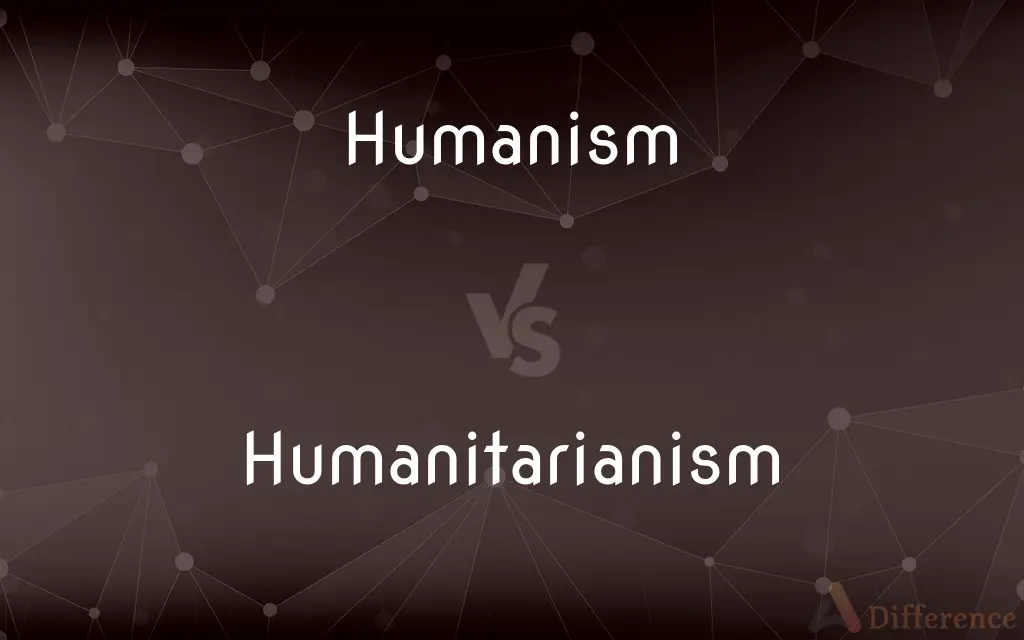Humanism vs. Humanitarianism — What's the Difference?
By Urooj Arif & Fiza Rafique — Updated on April 28, 2024
Humanism is a philosophical and ethical stance emphasizing human values and rational thinking, while humanitarianism focuses on promoting human welfare and alleviating suffering.

Difference Between Humanism and Humanitarianism
Table of Contents
ADVERTISEMENT
Key Differences
Humanism revolves around a philosophical and ethical perspective that stresses the value and agency of human beings, individually and collectively. It often involves a commitment to self-improvement, secularism, and critical thinking. Humanitarianism, on the other hand, is dedicated to promoting human welfare and is often associated with the relief of suffering and saving lives, particularly in crisis situations.
In humanism, the focus is on using reason, ethics, and justice to improve human conditions and increase knowledge. This philosophy historically opposes supernaturalism and emphasizes an individual's dignity and worth. Humanitarianism, whereas, is primarily concerned with immediate response to emergencies and crises, emphasizing compassion and direct aid to those in need.
While humanism supports the development of human potential and the pursuit of individual and societal improvement through education and liberal arts, humanitarianism involves interventions like providing food, medical aid, and disaster relief, which are essential for survival.
Humanism's principles guide its adherents towards a life based on rationalism and secular ethics, often influencing areas like politics, science, and art. Humanitarianism’s activities, on the other hand, are often carried out by organizations and volunteers focused on emergency response and sustainable development in less privileged areas.
The impacts of humanism can be seen in movements advocating for civil rights, secular governance, and ethical science. The impacts of humanitarianism are evident in disaster response, conflict resolution, and efforts to alleviate poverty and disease worldwide.
ADVERTISEMENT
Comparison Chart
Core Focus
Human values, rational thinking, self-improvement
Alleviating suffering, immediate aid
Key Elements
Secularism, education, ethics
Compassion, emergency relief, development aid
Philosophical Basis
Emphasis on reason and human dignity
Focus on compassion and practical aid
Typical Activities
Education, cultural development, advocacy
Disaster relief, medical aid, poverty alleviation
Impact Areas
Arts, science, politics
Emergency response, sustainable development
Compare with Definitions
Humanism
Philosophy focusing on human solutions to human issues.
Modern humanism often rejects supernaturalism, emphasizing secular approaches to moral questions.
Humanitarianism
An ethos of compassion towards people in need.
His humanitarianism was evident in his dedication to solving homelessness in his city.
Humanism
A system of thought that centers on human values and the importance of reason, ethics, and justice.
Renaissance humanism focused on classical antiquities to enhance cultural life.
Humanitarianism
The practice of promoting human welfare and social reform.
Nonprofits focused on humanitarianism often engage in long-term projects to develop water resources in arid regions.
Humanism
The belief in the potential of human creativity in absence of the divine.
His approach to science was deeply rooted in humanism, prioritizing empirical evidence over spiritual explanations.
Humanitarianism
Efforts to save lives and alleviate suffering.
After the earthquake, the immediate humanitarian response included medical teams and emergency food supplies.
Humanism
Advocacy for human rights and equal opportunities.
He promoted humanism by supporting initiatives that fostered equal educational opportunities for all children.
Humanitarianism
The belief in or pursuit of improving human welfare and achieving social reforms.
Her humanitarianism drove her to work with refugees, providing essential services and support.
Humanism
An emphasis on the dignity and worth of the individual person.
Humanist ceremonies celebrate life stages without religious connotations.
Humanitarianism
Aid and action taken to address emergencies in human crises.
International humanitarian organizations often respond first to global disasters and conflicts.
Humanism
Humanism is a philosophical stance that emphasizes the potential and agency of human beings, individually and socially. It considers human beings as the starting point for serious moral and philosophical inquiry.
Humanitarianism
Humanitarianism is an active belief in the value of human life, whereby humans practice benevolent treatment and provide assistance to other humans, in order to improve the conditions of humanity for moral, altruistic and logical reasons. Humanitarianism is today primarily understood as voluntary emergency aid in a transnational context, but it overlaps with human rights advocacy, actions taken by governments, development assistance, and domestic philanthropy.
Humanism
A system of thought that focuses on humans and their values, capacities, and worth.
Humanitarianism
One who is devoted to the promotion of human welfare and the advancement of social reforms.
Humanism
Humanism A cultural and intellectual movement of the Renaissance that emphasized human potential to attain excellence and promoted direct study of the literature, art, and civilization of classical Greece and Rome.
Humanitarianism
Showing concern for the welfare of humanity, especially in acting to improve the living conditions of impoverished people.
Humanism
The study of the humanities; learning in the liberal arts.
Humanitarianism
Being a situation in which many human lives are in danger of harm or death
The drought caused a humanitarian crisis.
Humanism
Secular humanism.
Humanitarianism
A humanitarian philosophy or practice.
Humanism
Concern with the interests, needs, and welfare of humans
"the newest flower on the vine of corporate humanism" (Savvy).
Humanitarianism
The distinctive tenet of the humanitarians in denying the divinity of Christ; also, the whole system of doctrine based upon this view of Christ.
Humanism
The study of the humanities or the liberal arts; literary (especially classical) scholarship.
Humanitarianism
The doctrine that man's obligations are limited to, and dependent alone upon, man and the human relations.
Humanism
Specifically, a cultural and intellectual movement in 14th-16th century Europe characterised by attention to classical culture and a promotion of vernacular texts, notably during the Renaissance.
Humanitarianism
The doctrine that people's duty is to promote human welfare
Humanism
An ethical system that centers on humans and their values, needs, interests, abilities, dignity and freedom; especially used for a secular one which rejects theistic religion and superstition.
Humanism
Humanitarianism, philanthropy.
Humanism
The study of the humanities; polite learning.
Humanism
A doctrine or ethical point of view that emphasizes the dignity and worth of individual people, rejects claims of supernatural influences on humans, and stresses the need for people to achieve improvement of society and self-fulfillment through reason and to develop human-oriented ethical values without theism.
Humanism
The doctrine that people's duty is to promote human welfare
Humanism
The doctrine emphasizing a person's capacity for self-realization through reason; rejects religion and the supernatural
Humanism
The cultural movement of the Renaissance; based on classical studies
Common Curiosities
What are the historical roots of humanism?
Humanism has its roots in ancient Greece and Rome, but it was significantly developed during the Renaissance when thinkers emphasized the value of human beings and the study of classical antiquities.
What are common criticisms of humanitarianism?
Common criticisms of humanitarianism include dependency creation, the potential for aid to be used for political leverage, and inefficiencies or corruption within aid organizations.
How does humanitarianism impact local economies?
Humanitarianism can have a positive impact by providing jobs and fostering market activity; however, it can also disrupt local economies if not managed carefully, such as by flooding markets with free goods that undermine local businesses.
How does humanitarianism address long-term problems?
Humanitarianism addresses long-term problems through sustainable development initiatives, education programs, and by building local capacities to manage and mitigate crises.
How can one become involved in humanitarian efforts?
One can become involved in humanitarian efforts by volunteering with NGOs, donating to humanitarian causes, or pursuing a career in fields like international development, medicine, or disaster response.
What is secular humanism?
Secular humanism is a branch of humanism that specifically emphasizes a secular framework, relying on reason, science, and moral philosophy without reference to religious doctrines.
What distinguishes humanitarianism from development aid?
Humanitarianism focuses on immediate relief and crisis response, aiming to save lives and alleviate suffering, while development aid focuses on long-term goals like improving economic stability, health, education, and governance.
How do humanists view the role of technology in society?
Many humanists view technology as a tool to enhance human capabilities and address societal problems, emphasizing ethical considerations in its development and use.
How do humanist values influence global politics?
Humanist values can influence global politics by promoting policies that emphasize human rights, democracy, and ethical governance, affecting international relations and domestic policies.
Is humanism connected to any religious beliefs?
Humanism is generally secular and non-religious, focusing on human values and reason rather than divine or supernatural beliefs, though there are forms like religious humanism that incorporate humanist principles with religious contexts.
What role do international laws play in humanitarianism?
International laws, such as those governing human rights and the rules of war, play a crucial role in humanitarianism by setting standards for the protection of individuals and the conduct of aid in conflict zones.
How does humanism address issues of morality and ethics?
Humanism addresses morality and ethics by advocating for principles based on reason, empirical understanding, and mutual respect among individuals, promoting a moral framework that is independent of religious doctrines.
Are there educational programs dedicated to humanism?
Yes, there are educational programs and courses dedicated to humanism, often found in university philosophy, ethics, and cultural studies departments.
What ethical dilemmas do humanitarian workers face?
Humanitarian workers often face ethical dilemmas such as prioritizing whom to help first, how to allocate scarce resources, and dealing with potentially corrupt practices within crisis zones.
Can humanitarian efforts sometimes fail? What causes these failures?
Yes, humanitarian efforts can fail due to various reasons including inadequate funding, poor planning, logistical challenges, conflict, and lack of coordination among agencies.
Share Your Discovery

Previous Comparison
Society vs. Club
Next Comparison
Courage vs. PerseveranceAuthor Spotlight
Written by
Urooj ArifUrooj is a skilled content writer at Ask Difference, known for her exceptional ability to simplify complex topics into engaging and informative content. With a passion for research and a flair for clear, concise writing, she consistently delivers articles that resonate with our diverse audience.
Co-written by
Fiza RafiqueFiza Rafique is a skilled content writer at AskDifference.com, where she meticulously refines and enhances written pieces. Drawing from her vast editorial expertise, Fiza ensures clarity, accuracy, and precision in every article. Passionate about language, she continually seeks to elevate the quality of content for readers worldwide.
















































